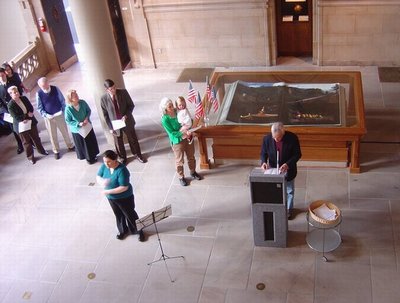September 30, 2010
‘We the people’: Read and hear the U.S. Constitution Oct. 8
There’s no need to be dramatic when you read aloud from the U.S. Constitution, as many on campus will do at noon Friday, Oct. 8, in Suzzallo Library — the words alone do the job.
“The document itself has such gravitas that it’s hard to avoid a certain degree of theatricality,” said Judith Howard, divisional dean of social sciences in the College of Arts and Sciences. Howard has been a regular participant in the annual reading, which is organized by Cassandra Hartnett, U.S. documents librarian for UW Libraries, the hosting department.
Howard said, “Last year, by complete coincidence, I was given the first words of the Constitution, and the sense of weight was remarkably imposing!” The mood of the reading, though, is meant to be relaxed, respectful, diverse and nonpartisan.
The reading is an annual event celebrating Constitution Day, which is actually Sept. 17, commemorating the famous document’s signing on that day in 1787. The UW event, now in its fifth year, was scheduled for Oct. 8 to be open to the whole campus community. It will be held, as in years past, on Suzzallo’s third floor, just outside of the Reading Room.
The reading typically involves up to 100 people, and usually takes a little more than an hour. Each participant is asked to read about five sentences. “It’s organized incredibly well,” Howard said. “As soon as you arrive you are handed a segment (of the text) and a number.”
Readers are then gathered in groups of 10 and the line moves quietly and quickly. “You don’t have time to get nervous,” Hartnett said. She added that participants can read and run along if their schedule is tight, though arriving early is recommended if one needs to leave early.
“We’ve staged it so that you don’t need to feel like you have to come for the entire time as a participant or an observer,” she said. And you can likely read more than once, if there are spaces available.
You can learn a lot more and sign up online to be a reader at the Constitution Day 2010 website. The website was created a few years ago by Cheryl Cameron, vice provost for academic personnel, and is now mounted by the Division of Social Sciences in collaboration with the Registrar’s office. The site has a number of informational links about the Constitution and its history.
Among these are essays about the Constitution written by students of Theodore Myhre, a lecturer in the UW School of Law, commenting on the Supreme Court, gay marriage, restricted rights during wartime and other issues.
This year’s website also features an essay by Matt Barreto, UW associate professor of political science and director of the Washington Institute for the Study of Race, Ethnicity & Sexuality, titled The Tea Party, the U.S. Constitution, and Support for Civil Rights and Civil Liberties in 2010. In the piece, Barreto discusses his groundbreaking research with Christopher Parker, associate professor of political science, “on topics related to equality, liberty, rights and more.” It’s revealing reading for anyone, of any political stripe, following the progress of the swelling Tea Party movement this election year.
Howard’s assistant, Janet Yale, also put together biographical information on each of the four women who have served on the Supreme Court. And there is a link to an analysis of the influence of women on the court by Lori Fossom, reference librarian at the UW’s Gallagher Law Library.
And if you wish to test your knowledge of the Constitution in a fun way, there’s a crossword puzzle, also created by Cameron, based on the historic document. (Try 12 down: “The only crime defined in the Constitution.”) The site also discusses controversies over the Constitution, lists UW-related classes on the subject and offers famous quotes about the document, as well as its full text.
All higher education institutions receiving federal funds are mandated to commemorate Constitution Day in whatever way they choose, making it a requirement as well as a privilege and pleasure.
Hartnett said it’s been heart-warming to see readers of all ages and backgrounds joining in. And though not every word of the Constitution is packed with drama, she said some observers over the years have been “visibly moved” by the reading. Maybe you will be, too.
Oh, and here’s a quote not listed there, from the late, iconoclastic journalist Molly Ivins: “It is possible to read the history of this country as one long struggle to extend the liberties established in our Constitution to everyone in America.”

